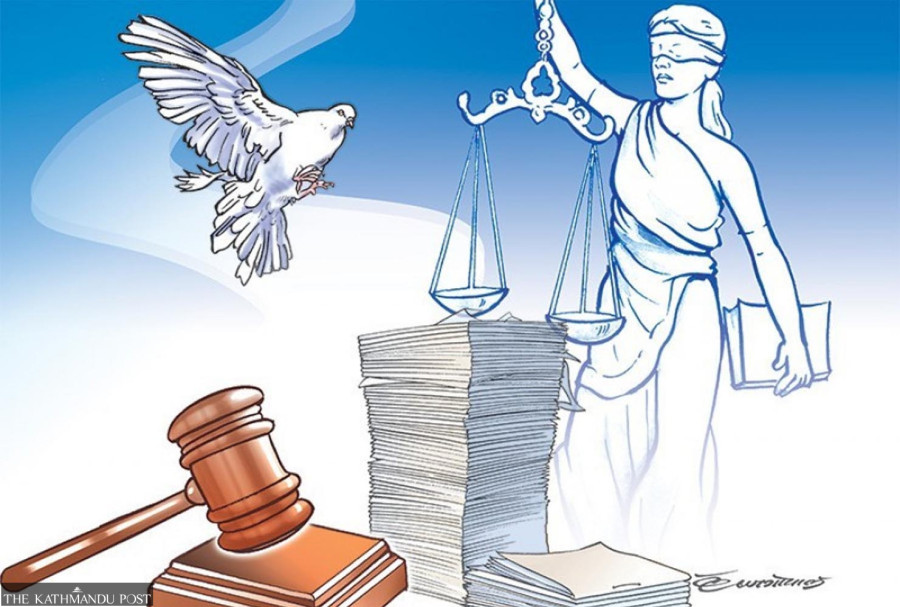National
17 amendment proposals to the bill on transitional justice law
Victims and rights activists say the current bill provides a loophole to define all murders as non-cruel and grant amnesty for all murders.
Tika R Pradhan
As many as 19 lawmakers have registered 17 amendments to the bill to amend the Enforced Disappearances Enquiry, Truth and Reconciliation Commission Act 2014, which was tabled in the House of Representatives on August 23.
The House of Representatives had on Monday given lawmakers three days to register their amendment proposals.
“A total of 19 lawmakers have registered 17 separate amendment proposals to the bill including one by three lawmakers,” said Bikash Shrestha, an officer at the Bills Section of Parliament.
As many as 12 UML lawmakers including Tirtha Gautam, Tulsi Thapa, Bidya Bhattarai, Shiva Maya Tumbahangphe, Binda Pande, Krishna Bhakta Pokhrel, Narayan Khatiwada, Shanti Pakhrin, Sher Bahadur Tamang, Bina Shrestha, Gokul Baskota and Padam Giri have registered their amendment proposals besides Prem Suwal of the Nepal Majdoor Kisan Party.
CPN (Maoist Centre) lawmakers Amrita Thapa, Yashoda Subedi Gurung and Durga Bishwakarma have registered a joint amendment proposal.
The ruling coalition of five parties–Nepali Congress, CPN (Maoist Centre), CPN (Unified Socialist), Janata Samajbadi Party and Rastriya Janamorcha—was preparing to endorse the bill through a fast-track process but due to criticism from various stakeholders including human rights activists and conflict victims, the government agreed to take the bill to the parliamentary Law, Justice and Human Rights Committee for discussions.
On August 13, the parties had agreed to revise the bill, which was registered in the lower house secretariat on July 15.
Domestic and international human rights defenders have been objecting to some provisions of the bill, which says “cruel murder” or murder after torture, rape, enforced disappearances and inhuman or cruel torture committed against unarmed or ordinary people during the insurgency are serious human rights violations and non-amnestiable. It, however, doesn’t list murder as serious violations of human rights providing a loophole to give amnesty in such cases.
Conflict victims say the bill has not listed war crimes and crimes against humanity under serious human rights violations.
Tirtha Gautam, wife of UML leader Yadu Gautam who was killed in a Maoist attack in 1999, is one of the 12 lawmakers who have registered amendment proposals.
Gautam said she has raised a few issues in her amendment proposal including on a provision that says the verdict of the Special Court cannot be appealed at the Supreme Court. She said the provision is against international fair trial guarantees.
“I have registered the proposal saying an appeal should be allowed,” Gautam told the Post. “I have also proposed that the all types of murders should be considered serious human rights violations.”
UML lawmakers including Gautam have said in their proposals that the victims should be given 35 days to register an appeal at the Supreme Court if they are not satisfied with the decision of the Special Court.
They have also proposed that the Special Court’s justices should be appointed not in consultation with the Judicial Council but on the recommendation of the council.
The bill also doesn’t have any provision to address the concerns of former child combatants.
The joint amendment proposal registered by a group of Maoist leaders, according to lawmaker Amrita Thapa, has proposed that the concerns of the combatants who were disqualified by the UN, and those who languished in jails and detentions should also be addressed.
“We have also proposed institutional honour to the victims of the war,” said Thapa. “Actually we want speedy endorsement of the bill, but the UML lawmakers are in a bid to delay it by registering individual amendment proposals.”
In their amendment proposal, the Maoist Centre lawmakers have also said the victims of the conflict should be given free education and health benefits besides unemployment allowances until they get employed, and they should also be provided grant support for those willing to run their business.
They have also stated that if the disappeared people were found to have died they should be declared ‘martyrs’ and given due honour and if not found they should be declared ‘fighters’.
The five parties in the ruling coalition were preparing to register a single amendment proposal but they could not do so due to some differences between lawmakers of Congress and the Maoist Centre.
The bill has been criticised for allegedly opening the door for amnesty for murder by saying only “cruel murder” will be non-amnestiable. Victims and rights activists say it provides a loophole to define all murders as non-cruel and grant amnesty for all murders.
Victims also objected to the provision that the insurgency-era cases of human rights violation that are sub judice in district courts and high courts will be sent to the two commissions to ascertain if they indeed are cases of serious violations of human rights.
According to Congress whip Min Bishwakarma, his party lawmakers have not registered any amendment proposals because there was an understanding with the UML lawmakers to incorporate Congress’ concerns in the amendment proposal prepared by the CPN-UML.
“We were planning to register amendments on behalf of the five coalition partners but that could not happen due to differences on some issues,” Bishwakarma said. “Since UML lawmakers said they would include our concerns as well in their amendment proposal, Congress lawmakers did not register any amendment proposals.”




 10.12°C Kathmandu
10.12°C Kathmandu















